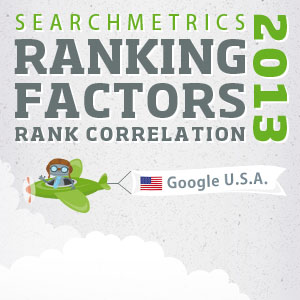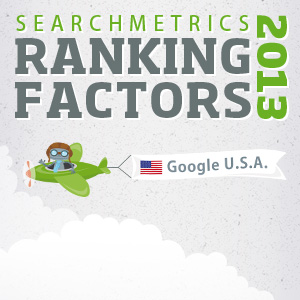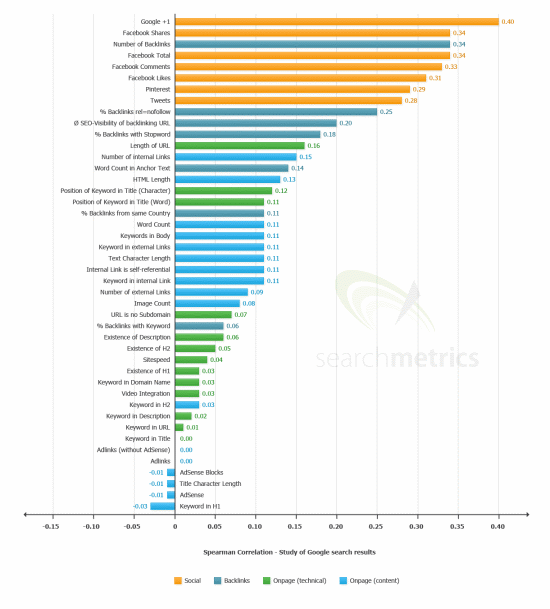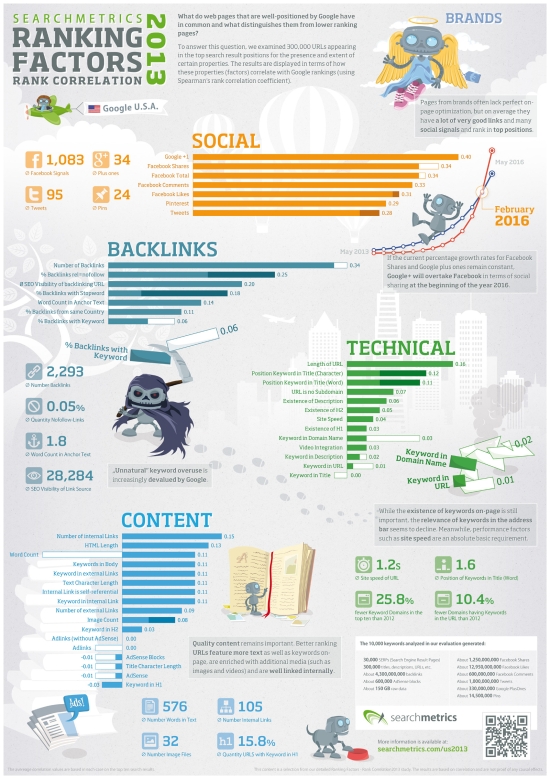It’s done. After weeks of data aggregation, evaluations, analyzing, processing, interpreting, and making the corresponding graphic implementations, it is finally finished: the 2013 Searchmetrics Ranking Factors for Google USA, also known as the 2013 Ranking Correlation (only sounds sillier).
 Once again, we have evaluated the 30 first search results of 10,000 keywords, thereby analyzing 300,000 websites. As a consequence, we have not only analyzed the top keywords, but also culled navigational searches as well; filtering largely brand search in order to deliver a better result. The result is 150 GB of data for all titles, descriptions, links, content, etc. – together with several billion backlinks, Facebook likes and shares, and millions of tweets and PlusOnes. In short: we have once again searched through a large, fresh database in order to show you what the top URLs in the Google SERPs have in common, and what makes them different from the more poorly ranked pages.
Once again, we have evaluated the 30 first search results of 10,000 keywords, thereby analyzing 300,000 websites. As a consequence, we have not only analyzed the top keywords, but also culled navigational searches as well; filtering largely brand search in order to deliver a better result. The result is 150 GB of data for all titles, descriptions, links, content, etc. – together with several billion backlinks, Facebook likes and shares, and millions of tweets and PlusOnes. In short: we have once again searched through a large, fresh database in order to show you what the top URLs in the Google SERPs have in common, and what makes them different from the more poorly ranked pages.
Trends from previous year and many new factors
In the process, we have greatly expanded our pool of factors compared to last year. In addition to a yearly comparison of the development trends from correlations already known from 2012, additional attributes now make it possible to perform an even deeper analysis in the areas of on-page content, on-page technology, backlinks and social signals. Incidentally, the evaluations already contain the findings according to the Penguin 2.0 update.
And again at the start, significant emphasis is placed on the difference between correlation and causal relation. A high correlation for an evaluated factor does not necessarily mean that this factor results in a better Google ranking, but rather that on average, more well-positioned pages exhibited this feature and more poorly placed pages did not. This also means that there are correlations that appear insignificant (frequently on-page), but are actually essential, because all the pages in the top 30 have that feature – a fact that utterly results in a small or even no correlation. For the full picture, please download the white paper.
An overview of the 2013 Rank Correlation
The fundamental approach for the calculation is the Spearman correlation (the same as in 2012), which is used to correlate the corresponding average values across the ranking position, depending on the trend. The following overview is thus to be read as: “The better the ranking of a page, the more often the factor X occurs on average.” And the more/less distinctive the value of factor X is, the higher/lower are the corresponding differences across the search result positions 1-30.
At first glance, links and social signals seem to be important, while on-page factors show somewhat lower correlation. As already mentioned, be aware of making a hasty interpretation of the data. Even factors with less distinctive correlation values could also be important, if not even a basic requirement for rankings (as already mentioned: On-page).
You can find a deeper analysis of this in a more detailed article that can also be downloaded as a white paper in PDF format.
> 2013 Ranking Factors for USA <
Here you can find additional graphics, details, and more in-depth results – and of course the entire study as well, which isabout 70 pages long.
A summary of the most important details
These are the most important results of our study at a glance:
- The number of backlinks remains of enormous importance
Not only the quantity, but also the quality of links differentiates well-ranked pages from those that place more poorly. The most “natural link profile” possible and “diversity” are keywords here. These are also observations shared by many others, at least since the Penguin updates. The analysis is therefore an additional confirmation of this.
- Keyword domains have lost relevance
Keyword domains and the factor “Keyword in the URL” appear to have been devalued by Google. Only a year ago, these factors were still correlated more positively with better rankings. The “Exact Match Domain” (EMD) Update by Google seems to have done a good job – as well as Penguin did.
- Quality and diversity count with respect to content
In relation to page content, factors like “length of text” and “number of images” correlate positively with improved rankings. But here the scale does not seem to be unlimited upwardly. Even more text is thus not equivalent to an even better position.
- On-page technology is one of the basics
A good technological page design is still a basic requirement for rankings in general and the existence of the keywords as well as the existence of H1, H2 and description on-page continues to be important.
- Social signals correlate very well with better rankings
This does not necessarily mean that social signals are a ranking factor. But the URLs in the top positions show significantly more social signals – that is a fact. It is also a fact that several studies have shown that social signals influence rankings. Studies in the US and Germany came to the same conclusion.
- Brands have a unique position
Some factors seem to apply to a different extent for brand pages than for non-brands. In any case, brands are different from other pages in the importance of some factors on average.
An extensive summary with graphics can be found, as mentioned, at www.searchmetrics.com/us2013
The infographic for the 2013 Ranking Factors
Last year they were in high demand; so we have developed an infographic with the most important outcomes for the 2013 Ranking Factors. Here’s how it looks:
If you would like to print out the files or would like to have a printable version, you can download the graphic here in high resolution. Have fun with it!
I am aware that the study offers plenty of discussion material, and as always, conclusions will be made without reading the study. That’s the way it goes. In spite of this, please let me know what you think of our insights. What is your opinion of the infographic (many thanks to Joerg, our Director Graphic Design) As always, I look forward to your feedback and a lively discussion!


